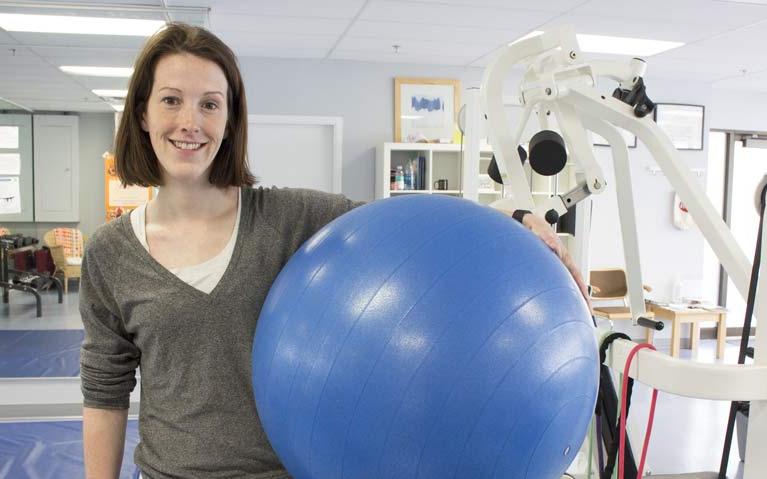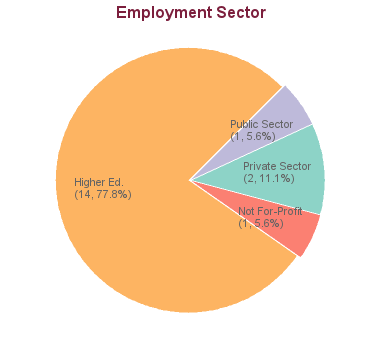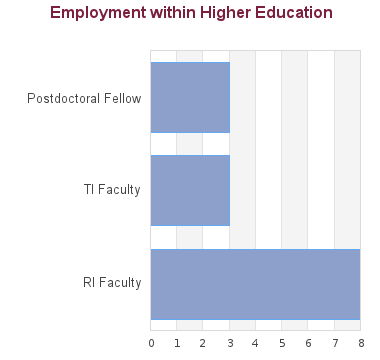
Amy Kirkham
Job Title
Postdoctoral Research Fellow
Employer
University of Alberta

Review details about the recently announced changes to study and work permits that apply to master’s and doctoral degree students. Read more
The Graduate Programs in Rehabilitation Sciences (RHSC) is jointly run by the Department of Occupational Sciences and Occupational Therapy (OSOT) and the Department of Physical Therapy (PT). It is a program for advanced research study and original investigation in areas relevant to the Rehabilitation Sciences at the Doctor of Philosophy (PhD) level. It focuses on the discipline of Rehabilitation Sciences - the study of providing treatment and education to persons with temporary or permanent disability to return them to maximum function, well-being and personally satisfying levels of independence.
It encompasses the three dimensions of the International Classification of Functioning, Disability and Health (body structure and function, activity and participation) and thus spans the individual, community and society. Our faculty have active research programs that cover this diverse spectrum.
In the Graduate Programs in Rehabilitation Sciences, we strive to create outstanding learning and research experiences for occupational therapists, physical therapists and others with various health-related disciplines. Through these opportunities, in combination with the PhD thesis, graduates advance the science of rehabilitation which aims to promote physical, mental and social well-being among people of all levels of ability. Our collaborative initiatives result in a reciprocal transfer of new knowledge among academic, clinical, and community settings.
Our faculty have an outstanding record of scholarly productivity, receiving funding from provincial and national research granting agencies. Over 30 graduate students from a broad range of backgrounds including occupational therapy, physical therapy, recreation therapy, social sciences, human kinetics, and engineering have graduated from our program. These students have authored numerous peer-reviewed journal publications and won various scholarships and awards.
Program faculty members are well integrated with several of the world class research facilities established here in BC including: Arthritis Research Centre, Brain Research Centre, Centre for Hip Health, International Collaboration on Repair Discoveries, Centre for Heart and Lung Innovation, Vancouver Coastal Health Research Institute, Providence Health Care Research Institute, GF Strong Rehabilitation Centre, and the BC Children's Hospital Research Institute.
The Faculty of Graduate and Postdoctoral Studies establishes the minimum admission requirements common to all applicants, usually a minimum overall average in the B+ range (76% at UBC). The graduate program that you are applying to may have additional requirements. Please review the specific requirements for applicants with credentials from institutions in:
Each program may set higher academic minimum requirements. Please review the program website carefully to understand the program requirements. Meeting the minimum requirements does not guarantee admission as it is a competitive process.
Applicants from a university outside Canada in which English is not the primary language of instruction must provide results of an English language proficiency examination as part of their application. Tests must have been taken within the last 24 months at the time of submission of your application.
Minimum requirements for the two most common English language proficiency tests to apply to this program are listed below:
Overall score requirement: 100
Reading
23
Writing
23
Speaking
23
Listening
23
Overall score requirement: 7.5
Reading
7.0
Writing
7.0
Speaking
7.0
Listening
7.0
Some programs require additional test scores such as the Graduate Record Examination (GRE) or the Graduate Management Test (GMAT). The requirements for this program are:
The GRE is required by some applicants. Please check the program website.
Completion of a recognized baccalaureate degree and thesis-based master’s degree in Rehabilitation Sciences, or other related field.
A minimum of 3 credits in research methods or statistics
Applicants from non-Canadian or United States universities may be required to provide general (GRE) (Graduate Record Examination) scores as part of their application at the request of their proposed supervisor. Scores must be valid within the past 2 years.
Deadline to submit online application. No changes can be made to the application after submission.
Transcript DeadlineDeadline to upload scans of official transcripts through the applicant portal in support of a submitted application. Information for accessing the applicant portal will be provided after submitting an online application for admission.
Referee DeadlineDeadline for the referees identified in the application for admission to submit references. See Letters of Reference for more information.
All applicants have to submit transcripts from all past post-secondary study. Document submission requirements depend on whether your institution of study is within Canada or outside of Canada.
A minimum of two references are required for application to graduate programs at UBC. Each graduate program determines the type of reference (e.g. academic, professional) and number of references they require which can range from 2 to 4. References should be requested from individuals who are prepared to provide a report on your qualifications for the program.
Many programs require a statement of interest, sometimes called a "statement of intent", "description of research interests" or something similar.
Students in research-based programs usually require a faculty member to function as their thesis supervisor. Please follow the instructions provided by each program whether applicants should contact faculty members.
Permanent Residents of Canada must provide a clear photocopy of both sides of the Permanent Resident card.
All applicants must complete an online application form and pay the application fee to be considered for admission to UBC.
| Fees | Canadian Citizen / Permanent Resident / Refugee / Diplomat | International |
|---|---|---|
| Application Fee | $116.25 | $168.25 |
| Tuition * | ||
| Installments per year | 3 | 3 |
| Tuition per installment | $1,875.34 | $3,294.66 |
| Tuition per year (plus annual increase, usually 2%-5%) | $5,626.02 | $9,883.98 |
| Int. Tuition Award (ITA) per year (if eligible) | $3,200.00 (-) | |
| Other Fees and Costs | ||
| Student Fees (yearly) | $1,144.10 (approx.) | |
| Costs of living | Estimate your costs of living with our interactive tool in order to start developing a financial plan for your graduate studies. | |
Applicants to UBC have access to a variety of funding options, including merit-based (i.e. based on your academic performance) and need-based (i.e. based on your financial situation) opportunities.
From September 2024 all full-time students in UBC-Vancouver PhD programs will be provided with a funding package of at least $24,000 for each of the first four years of their PhD. The funding package may consist of any combination of internal or external awards, teaching-related work, research assistantships, and graduate academic assistantships. Please note that many graduate programs provide funding packages that are substantially greater than $24,000 per year. Please check with your prospective graduate program for specific details of the funding provided to its PhD students.
This results in a net balance (any funding provided to the student minus tuition and fees) mean of $29,989 and median of $28,393.
All applicants are encouraged to review the awards listing to identify potential opportunities to fund their graduate education. The database lists merit-based scholarships and awards and allows for filtering by various criteria, such as domestic vs. international or degree level.
Many professors are able to provide Research Assistantships (GRA) from their research grants to support full-time graduate students studying under their supervision. The duties constitute part of the student's graduate degree requirements. A Graduate Research Assistantship is considered a form of fellowship for a period of graduate study and is therefore not covered by a collective agreement. Stipends vary widely, and are dependent on the field of study and the type of research grant from which the assistantship is being funded.
Graduate programs may have Teaching Assistantships available for registered full-time graduate students. Full teaching assistantships involve 12 hours work per week in preparation, lecturing, or laboratory instruction although many graduate programs offer partial TA appointments at less than 12 hours per week. Teaching assistantship rates are set by collective bargaining between the University and the Teaching Assistants' Union.
Academic Assistantships are employment opportunities to perform work that is relevant to the university or to an individual faculty member, but not to support the student’s graduate research and thesis. Wages are considered regular earnings and when paid monthly, include vacation pay.
Canadian and US applicants may qualify for governmental loans to finance their studies. Please review eligibility and types of loans.
All students may be able to access private sector or bank loans.
Many foreign governments provide support to their citizens in pursuing education abroad. International applicants should check the various governmental resources in their home country, such as the Department of Education, for available scholarships.
The possibility to pursue work to supplement income may depend on the demands the program has on students. It should be carefully weighed if work leads to prolonged program durations or whether work placements can be meaningfully embedded into a program.
International students enrolled as full-time students with a valid study permit can work on campus for unlimited hours and work off-campus for no more than 24 hours a week during academic sessions.
A good starting point to explore student jobs is the UBC Work Learn program or a Co-Op placement.
Students with taxable income in Canada may be able to claim federal or provincial tax credits.
Canadian residents with RRSP accounts may be able to use the Lifelong Learning Plan (LLP) which allows students to withdraw amounts from their registered retirement savings plan (RRSPs) to finance full-time training or education for themselves or their partner.
Please review Filing taxes in Canada on the student services website for more information.
Applicants have access to the cost estimator to develop a financial plan that takes into account various income sources and expenses.
18 students graduated between 2005 and 2013. Of these, career information was obtained for 18 alumni (based on research conducted between Feb-May 2016):


Graduates from our programs go on to become faculty members who teach and conduct research at universities. They also work as research scientists, clinical scientists and consultants to government, health authorities and other organizations with interests in rehabilitation specifically, and health care as a whole.
These statistics show data for the Doctor of Philosophy in Rehabilitation Sciences (PhD). Data are separated for each degree program combination. You may view data for other degree options in the respective program profile.
| 2023 | 2022 | 2021 | 2020 | 2019 | |
|---|---|---|---|---|---|
| Applications | 9 | 9 | 10 | 19 | 18 |
| Offers | 8 | 8 | 8 | 18 | 12 |
| New Enrolment | 4 | 7 | 7 | 15 | 10 |
| Total Enrolment | 52 | 45 | 49 | 48 | 34 |
Students in research-based programs usually require a faculty member to function as their thesis supervisor. Please follow the instructions provided by each program whether applicants should contact faculty members.
These videos contain some general advice from faculty across UBC on finding and reaching out to a supervisor. They are not program specific.
| Year | Citation |
|---|---|
| 2015 | Dr. Gerlach identified how an early intervention program fostered health equity for Indigenous children, by being responsive to the lived realities and priorities of Indigenous families. This socially responsive form of intervention challenges our assumptions about early childhood programming for families and children who experience marginalization. |
| 2015 | Dr. Pollock examined how people control their balance after suffering a stroke. She found motor control deficits and heightened anxiety affect postural responses post-stroke. Her findings suggest there are positive and negative compensations in the way the body responds to loss of balance. Dr. Pollock aims to improve rehabilitation following a stroke. |
| 2015 | Dr. Best studied how adults living in the community use their wheelchairs. She contributed to our understanding of the challenges of using a wheelchair, and why improved wheelchair skills and confidence are important for achieving successful wheelchair use. Her findings support a new rehabilitative approach that may benefit adult wheelchair users. |
| 2014 | The 21st century marked a shift in the perspective of care for people with disabilities. Dr. Mousavi explored the views of Canadian occupational therapists on this Capabilities Approach. The study concluded that this approach could help to align rehabilitation services with human rights initiatives of the World Health Organization. |
| 2013 | Dr. Sakakibara studied the confidence, mobility, and participation in daily and social activities of adult wheelchair users. His findings demonstrate that confidence with wheelchair use has important implications for mobility and participation. His work provides a foundation for developing strategies to enhance confidence for those using wheelchairs. |
| 2013 | Dr. Casey engaged ten people living with schizophrenia to understand their "experience of meaning in activity". After two years of research, she concluded that participating in meaningful activity is influenced by notions of social inclusion and justice, that experiences are varied and ultimately connected to meaning in life, well-being and recovery. |
| 2013 | Dr. Al-Bannay focused on the health of women in Saudi Arabia, with special reference to type 2 diabetes mellitus. She studied the health beliefs and behaviours of the women, and the outcomes of a pilot diabetes education program. Findings show that Saudi women experience lifestyle-related conditions and could benefit from the education program. |
| 2013 | Dr. Haj Ghanbari examined muscle atrophy, pain and physical activity in people with chronic obstructive pulmonary disease. Her research provides evidence that some muscles are more affected by this disease, and secondly, pain is very common and often limits physical activities in people affected by this chronic respiratory condition. |
| 2012 | Dr. Wada explored how dual-income parents with young children conceive life balance, and identified two competing conceptions: managing life as being collective-needs based, and participating in a mix of occupations, which is based on the individual needs of the parents. Findings advance theories about life balance and social support that promote the health of parents and the family. |
| 2012 | Dr. Lal explored how youth recently diagnosed with a psychiatric disorder develop resilience, that is the capacity to cope with adversity. Her research showed that participants restore, maintain and enhance their resilience through the types of stories they tell in relation to their illness and the types of activities in which they engage. |
The Master of Science in Rehabilitation Science (MSc) is designed to prepare individuals to conduct research independently and in collaboration with other scientists. Students will investigate an area of research relevant to rehabilitation through critical analysis of problems related to basic sciences, clinical practice, or to development of theory.
The Master of Rehabilitation Science (MRSc) is designed for working health professionals and to enhance interdisciplinary practice. Unlike traditional thesis-based research master’s programs, the MRSc is a combination of courses and a work- or practice-based research project. The MRSc allows you to obtain a master’s degree without interrupting your work.
The Doctor of Philosophy (PhD) focuses on the discipline of rehabilitation sciences, the study of providing treatment and education to persons with temporary or permanent disability to return them to maximum function, well-being and personally-satisfying levels of independence.
Departments/Programs may update graduate degree program details through the Faculty & Staff portal. To update contact details for application inquiries, please use this form.

This city won’t disappoint. It has it all: sea, parks, mountains, beaches and all four seasons, including beautiful summers and mild, wet winters with snow.